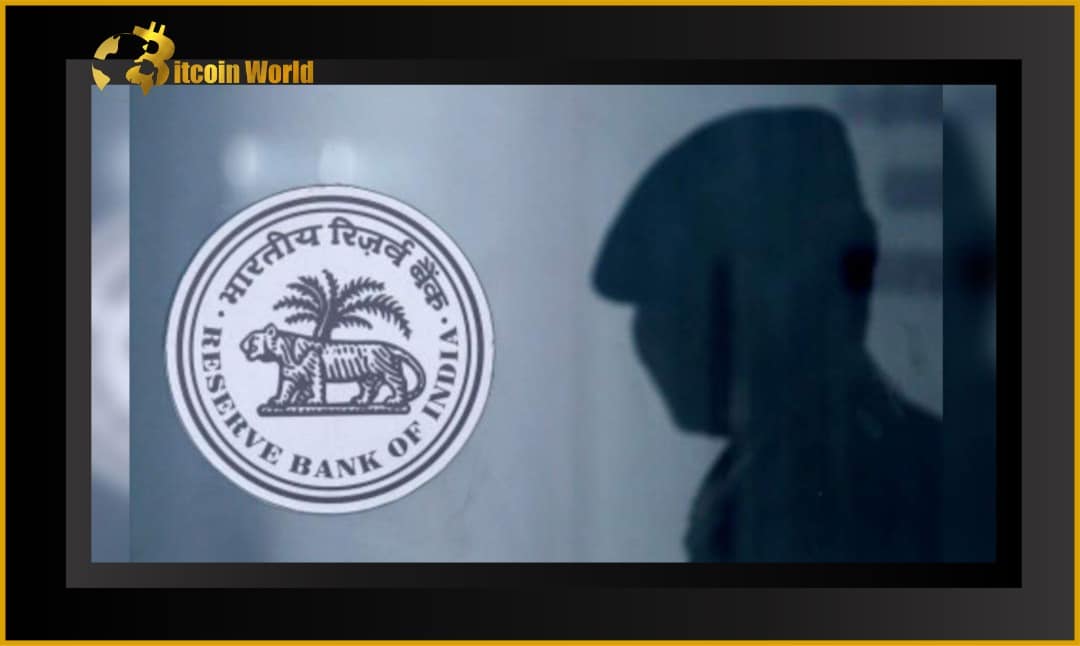India’s cryptocurrency landscape is buzzing with activity, yet a crucial piece of the puzzle remains uncertain: the stance of Indian banks. Despite legal victories for the crypto industry, banks are reportedly hesitant to fully embrace crypto transactions, leaving investors and exchanges in a state of limbo. Why this hesitation? It all boils down to the Reserve Bank of India (RBI) and its perceived mixed signals.
Banks in a Bind: Waiting for RBI’s Green Light?
According to sources within the banking sector, who preferred to remain anonymous, banks are walking on eggshells, wary of any move that might displease the RBI. They are essentially waiting for clear recommendations from the central bank before they feel comfortable supporting cryptocurrency trade. This cautious approach stems from a history of regulatory uncertainty surrounding crypto in India.
Let’s rewind a bit. Back in 2018, the RBI issued a circular effectively banning banks from providing services to crypto businesses. This move sent shockwaves through the nascent Indian crypto market. However, in a landmark decision in March 2020, the Indian Supreme Court overturned this ban, deeming it unconstitutional. This was seen as a major win for the crypto community, but the celebration was short-lived. Many banks continue to drag their feet, citing concerns about compliance and the lack of explicit clarity from the RBI.
Bhagaban Behera, co-founder and CEO of the Indian crypto exchange Defy, sums up the situation perfectly: “Banks do not want to participate right now because they don’t have full clarity from The Reserve Bank of India or the government yet.” This lack of clear direction is creating a bottleneck for wider crypto adoption in India.
Currently, less than half of India’s banks are willing to supply crypto-related services, according to Behera’s experience.
Behera further elaborates, “Just a couple of smaller banks in India are comfortable allowing investors to open bank accounts and exchanges to have transactions.” He emphasizes, “That’s the real challenge right now.” This limited banking support restricts the ease of transactions and overall growth of the crypto ecosystem in India.
Taxation vs. Clarity: What Banks Are Really Looking For?
Adding another layer to the narrative, India’s Finance Minister Nirmala Sitharaman announced in her budget speech on February 1st a significant development: the RBI will launch a central bank digital currency (CBDC) in the upcoming fiscal year. This CBDC is expected to potentially compete with private cryptocurrencies. Simultaneously, the government also introduced a 30% tax on income from cryptocurrency gains. This tax move led many to believe that the government was finally legitimizing crypto.
However, Sathvik Vishwanath, CEO of the Indian crypto exchange Unocoin, offers a crucial perspective. “Taxation does not mean anything to banks,” he points out. “Tax [liability] is on the individual — on what he or she files in income declaration every year — not on the banks.” In essence, while taxation provides a framework for revenue collection from crypto activities, it doesn’t address the underlying concerns banks have regarding risk and regulatory compliance.
For the time being, local exchanges expect banks to remain cautious, while those that do will continue to monitor transactions because exchanges still lack the ability to report questionable transactions.
RBI’s Mixed Signals: Friend or Foe to Crypto?
Vishwanath highlights the core issue from a bank’s viewpoint: “There is a risk-taking ability for the banks because if tomorrow there is something illegal, then they don’t want a bad name for the bank.” Banks are understandably risk-averse and need clear guidelines to operate confidently in the crypto space. The current ambiguity leaves them vulnerable to potential regulatory backlash.
The hope is that as regulations evolve, cryptocurrency trading will eventually be treated with the same regulatory clarity as mutual funds and the equity market. However, the path forward remains uncertain, particularly given the contrasting statements emanating from the RBI.
While the Finance Minister has stated that the government and RBI are in “perfect agreement” on crypto decisions, including regulation, recent statements from RBI officials paint a different picture. RBI Deputy Governor Shri T Rabi Shankar, shortly after the budget announcement, proposed an outright ban on cryptocurrencies. He likened them to Ponzi schemes, arguing that their existence destabilizes the currency system, monetary policy, banking system, and the government’s economic control.
Adding to the confusion, RBI Governor Shaktikanta Das has also publicly cautioned investors about the risks associated with cryptocurrencies, famously stating that digital assets are “not even a tulip,” referencing the infamous tulip mania bubble.
The Road Ahead: Clarity or Continued Confusion?
So, where does this leave the Indian crypto market? The Supreme Court ruling provided a legal foundation, and the government’s taxation policy suggests a degree of acceptance. However, the RBI’s apparent skepticism and lack of clear directives are keeping banks on the sidelines, hindering widespread crypto adoption.
Here’s a quick recap of the key challenges:
- RBI Ambiguity: Banks are awaiting clear guidelines and recommendations from the RBI.
- Risk Aversion: Banks are hesitant due to perceived risks and lack of regulatory clarity.
- Limited Banking Support: Only a fraction of banks currently offer crypto-related services.
- Regulatory Uncertainty: Conflicting signals from different arms of the government and RBI create confusion.
For the Indian crypto market to truly flourish, clarity is paramount. Banks need a clear regulatory framework from the RBI to confidently engage with the crypto industry. Until then, the uncertainty will likely persist, potentially slowing down the growth and adoption of cryptocurrencies in India, despite the immense potential of this burgeoning sector.
Related Posts – Ferrari joins the NFT universe through a collaboration with a Swiss…
Disclaimer: The information provided is not trading advice, Bitcoinworld.co.in holds no liability for any investments made based on the information provided on this page. We strongly recommend independent research and/or consultation with a qualified professional before making any investment decisions.




